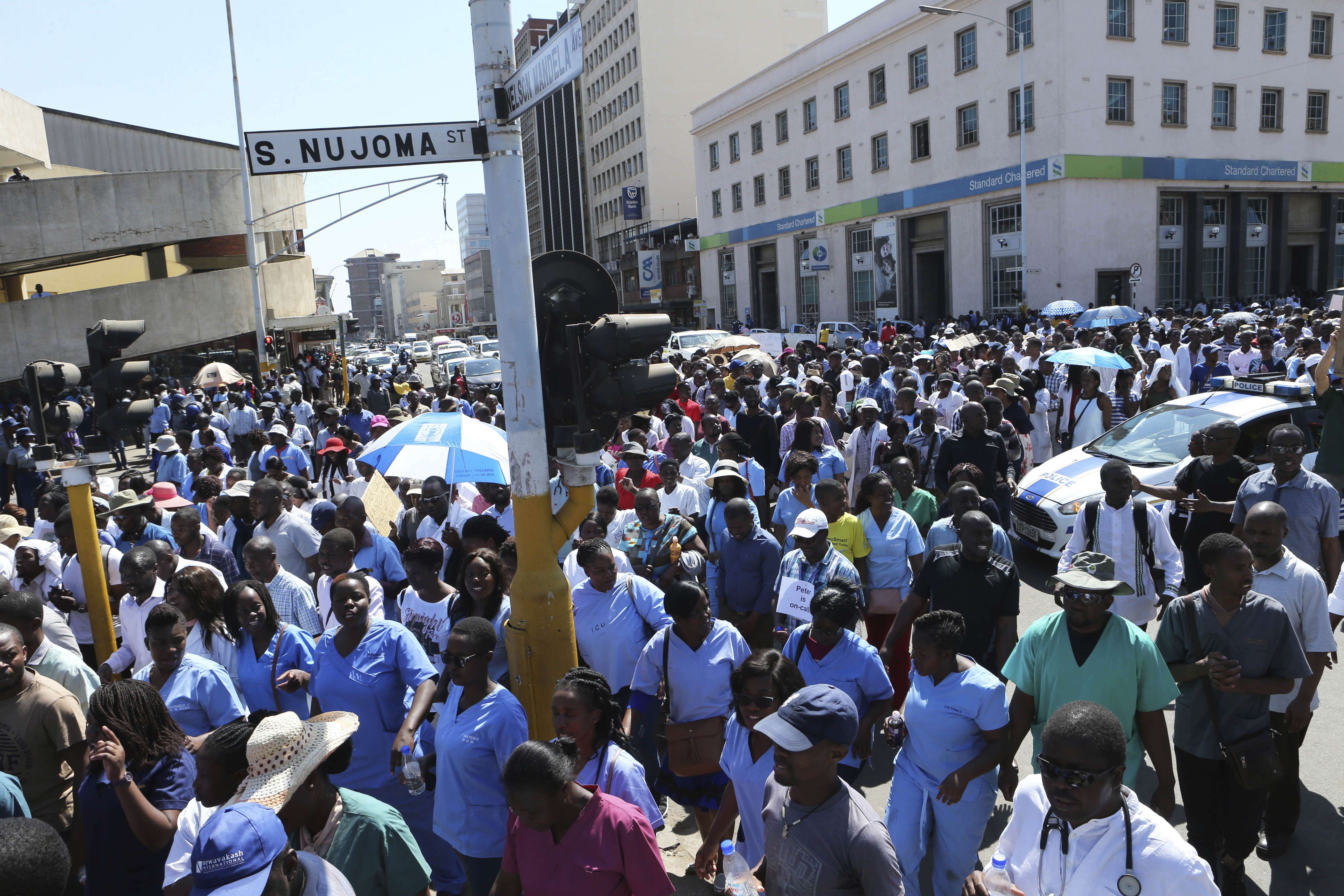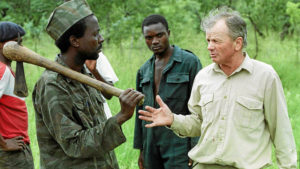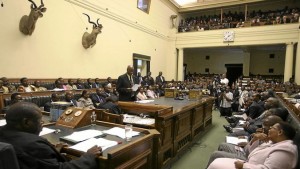
But it was on social media that Zimbabweans first found their voice to rise up against the 93-year-old strongman, with platforms like WhatsApp, Facebook, and Twitter proving to be vital in mobilizing and coordinating countrywide protests.
Now, just two years later, activists say the government that replaced Mugabe’s is trying to silence those same social media accounts with legislation that bears all the hallmarks of China’s dystopian censorship and surveillance system.
“It is a terrifying piece of legislation”
Zimbabwe’s Parliament is weighing legislation that would authorize the use of surveillance technologies, grant sweeping powers to crack down on social media users, and allow the government to snoop on citizens’ private communications. The latest version of the bill — known as the Cyber Crime, Cyber Security and Data Protection Bill of 2019 — was passed by President Emmerson Mnangagwa’s Cabinet last month and is currently being drafted for publication and approval by Parliament, where it’s expected to easily pass under Mnangagwa’s Zanu-PF party majority.
Activists warn things could get ugly soon after that.
“It is a terrifying piece of legislation,” Bekezela Gumbo, a researcher at the Zimbabwe Democracy Institute, told VICE News. “It has everything it needs to give the ruling Zanu-PF party and its agents in government the legal basis to imprison opponents using the internet.”
Although the public still doesn’t know exactly what the final version of the bill will contain, activists say it’ll likely be overly broad and lacking the sort of necessary protections that rights groups have called for in the past.
“The definitions of crimes were described in such broad terms that they could arrest people because they have said something on a social media platform to criticize the government or say something that is unfair to government,” Kuda Hove, a legal expert with the Media Institute of Southern Africa, told VICE News, referring to a previous draft of the bill he’d seen.
From Twitter to the streets
ZIMBABWEAN MEDICAL STAFF MARCH ON THE STREETS OF HARARE, THURSDAY SEPT, 19, 2019. ZIMBABWEAN DOCTORS PROTESTING THE ALLEGED ABDUCTION OF A UNION LEADER WON A HIGH COURT RULING ALLOWING THEM TO MARCH AND HANDOVER A PETITION TO THE PARLIAMENT.THE ZIMBABWE HOSPITAL DOCTORS ASSOCIATION HAS SAID ITS PRESIDENT, PETER MAGOMBEYI, WAS ABDUCTED ON SATURDAY AFTER CALLING FOR A PAY STRIKE, AND MEMBERS SAY THEY WILL NOT RETURN TO WORK UNTIL HE IS FOUND. (AP PHOTO/TSVANGIRAYI MUKWAZHI)
Back in 2016, social media was the spark for the protests that would ultimately lead to Mugabe’s ouster in 2017. It was on Facebook, Twitter, and critically WhatsApp that the genesis of the protest movement began to take shape.
At the time, WhatsApp accounted for over one-third of all mobile data used in Zimbabwe as citizens shared anti-government news and information about demonstrations.
Officials were powerless at the time to stop the surge in online dissent, and they began exploring ways to curb it. It was during that period, as Mugabe was losing his grip on power, that the first version of the Computer Crime and Cyber Crime Bill was drafted.
Since Mugabe’s departure, the bill has seen a number of revisions. The most recent version remains shrouded in mystery, but it includes a vague mandate to protect “cyberspace,” according to Mnangagwa.
The president’s office did not respond to multiple requests for comment on the latest bill approved by the Cabinet. The only official who would speak was Ivanhoe Gurira, the principal director at the Ministry of Information, who denied the bill was meant to promote censorship, claiming Zimbabwe has other laws that help protect access to information and freedom of speech.
When asked about the criticism from activists about the new law, Gurira said: “Only those people that want to operate outside the law would say so.”
But Mnangagwa’s government has already shown its willingness to restrict online speech.
In January, the government partially shut off internet access and blocked access to social media platforms including Facebook, WhatsApp, Twitter, LinkedIn, Reddit, and Tinder. The move came as the government struggled to contain protests over a sharp spike in fuel prices and generally deteriorating economic conditions. The internet shutdown was soon followed by a brutal military crackdown that left a dozen people dead and over 170 more injured.
Access to the internet was restored a week later, but only after the High Court ruled the government’s order was illegal. Free speech activists say the new cybercrime bill would essentially make another shutdown legal.
“With such precedent, it is indubitable that the underlying intention of the proposed law is to curtail citizens’ fundamental political and civil liberties, especially as government battles to contain the tanking economy and rising citizens agitation,” Nhlanhla Ngwenya, program director at the Open Society Initiative for Southern Africa, told VICE News.
The government has also arrested numerous individuals for online activities since Mnangagwa came to power, including Evan Mawarire, a pastor who was charged with inciting public violence after he posted messages in support of the labor protests on Facebook and Twitter.
“We’re in a country where the basic freedoms that are provided for in the constitution for citizens are being blatantly violated. People are not allowed to speak freely. The amount of arrests that have taken place of people who have spoken out or against the government is shocking,” Mawarire told CNN this week.
Now, under Mnangagwa’s rule, the government is hoping to expand its crackdown on free speech online — and to do that it’s taking its lead from the world’s worst abuser of the internet: China.
China’s deep ties
China and Zimbabwe have long and deep ties that stretch back decades and run to the very highest levels of government.
Many of Zimbabwe’s senior leaders, including Mnangagwa and Vice President Constantino Chiwenga, received military training in China back in the early 1960s.
“You can’t overstate how deep the ties go between these two governments,” Eric Olander, managing editor of the nonpartisan China Africa Project, told VICE News. “They go back a long way together and there’s no indication either side is wavering in their mutual commitment to one another.”
“You can’t overstate how deep the ties go between these two governments”
On the technology front, China is already helping the Zimbabwe government keep a closer eye on its citizens. As part of Beijing’s $71 million Belt and Road investment in the country, the Zimbabwe government has partnered with Chinese facial recognition company CloudWalk Technology to create a surveillance network similar to the one deployed to monitor Uighurs in Xinjiang.
The deal sees CloudWalk technology monitoring major transport hubs and using the data to build a national facial recognition database. The deal also gives the Chinese company access to a rich trove of data on African faces.
Critics worry the new cybersecurity law would augment this nascent surveillance network by monitoring citizens’ online activities as well as their offline movements. And while China’s involvement in Zimbabwe’s surveillance plans remain far from clear, experts expect Harare to lean heavily on Beijing’s expertise to roll it out.
“We probably don’t need a lot of evidence to draw the conclusion that China will likely lend its expertise to building this kind of digital surveillance, given the trust that exists between these two governments and China’s expertise in this area,” Olander said. “Plus, the Chinese have an entire mechanism in place to provide the financing, implementation, and training on how to use technology like this.”
In fact, the Zimbabwean government may have already been inspired by China during the drafting of the new legislation. Officials from the Zimbabwean government were among representatives from three dozen countries who travelled to China in recent years to for weeks-long seminars on information management, according to Sarah Cook, a senior China researcher with Freedom House.
With China’s expertise, Mnangagwa’s government could get closer to stemming the sort of upheaval that toppled his predecessor before it even begins.
“This law is a response to the use of social media by activists, citizen journalists, and researchers during protests, accountability monitoring, and political mobilization,” Gumbo said. “This is what the government doesn’t want, and the bill is a mechanism to avoid public scrutiny. It is meant to curtail freedom of expression.”









